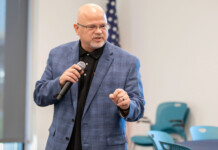inmaricopa.com runs, on a regular basis, opinion pieces. The following article is the opinion of the author, and does not necessarily reflect the views of inmaricopa.com.
“If it sounds too good to be true, it probably is. If someone approaches you, and they are not a certified professional with credentials that you can verify with a state agency, then do not trust them,” said Arizona Corporation Commissioner (ACC) Gary Pierce.
The ACC is warning investors to be on guard against the rise in affinity group fraud, an especially pernicious type of fraud because the perpetrators are people who the investor knows or claims to have the same social, cultural, or religious background.
In a world of increasing complexity, many people might feel the need for a shorthand way of knowing whom to trust, especially when it comes to investing money. Unfamiliar with how our financial markets work, too many people don’t know how to thoroughly research an investment and its salesperson. So, when someone who is part of a known group offers an investment, too often investors don’t go further to verify that the person is a registered salesperson and that what they are offering is a legitimate investment.
One method these unscrupulous promoters use to lull members into misplaced trust is by first selling to a few prominent members of a group, then pitching the scam to the rest of the group by using the names of those to whom they previously sold. Hearing that well-respected members of the group have invested lowers the natural skepticism of the individual, and one more victim is added to the sales column.
Another method is to find members of long-established minority groups who have accumulated savings over the years and have achieved a certain standard of living through years of hard work. Often, these people want to “give back” to the community and help others like themselves.
However, such inclinations often make these group members sitting ducks for deceitful con artists who, despite sharing the same ethnicity or culture, are really motivated solely by greed. Once a victim realizes that he or she has been scammed, too often the response is not to notify the authorities but instead to try to solve problems within the group.
Religious affinity group fraud also continues to be a widespread problem. And swindlers who prey upon people of their own religion come in all denominations. As an example, in December, the Corporation Commission unanimously voted to sanction Chandler residents Edward A. Purvis and wife Maureen Purvis, Gregg Wolfe and their company, Nakami Chi Group Ministries International in one of the largest affinity fraud cases in Arizona since the Baptist Foundation. The Commission ordered over $11 million in restitution and $250,000 in administrative penalties.
The Commission’s decision found that ringleaders Purvis and Wolfe gained the trust of churchgoers, members and leadership-including at least one pastor-through their ties with three Arizona churches. Through their affinity with the churches, Purvis and Wolfe wove a web of deceit to convince at least 80 investors to buy company stock, short-term bridge loan investments and promissory notes.
How to avoid affinity group fraud:
· Beware of the use of names or testimonials from other group members. Scam artists frequently pay out high returns to early investors using money from later investors. Accordingly, early investors may be wildly enthusiastic about a scheme that may collapse entirely once you’ve invested.
· Obtain a prospectus or other form of written information that details the risks in the investment and procedures to get your money out.
· Ask for professional advice from a neutral outside expert not in your group-an accountant, attorney or financial planner-to evaluate the investment.
“These affinity scams exploit friendships and trusting relationships and are the worst kind of securities fraud,” said ACC Chairwoman Kris Mayes. “The Commission will continue its effort to prevent these fraudulent predators from preying on Arizonans, especially during these tough economic times.”
More caution for investors:
Even when investing with someone they know, investors should verify the registration of sellers and investment opportunities and investigate disciplinary histories by contacting the Arizona Corporation Commission’s Securities Division at 602-542-4242 or toll free in Arizona at 1-866-VERIFY-9. The Division’s investor education web site also has helpful information.
File photo
Have an opinion you’d like to share with Maricopa? Please email it and any applicable photos to [email protected] for consideration.









![Maricopa restaurateur makes Food Network connection [Namkeen Dhaba]](https://www.inmaricopa.com/wp-content/uploads/2024/04/439456716_377105198650519_7536248579664805896_n-218x150.jpg)
![Merging lanes incite more 347 anger A merging lane sign sits on the side of State Route 347 northbound lanes during evening traffic on April 30, 2024. [Monica D. Spencer]](https://www.inmaricopa.com/wp-content/uploads/2024/04/spencer-043024-adot-merging-lanes-347-web-218x150.jpg)




